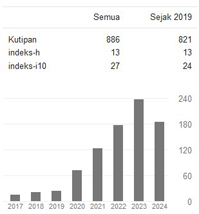POPULISME, KRISIS DEMOKRASI, DAN ANTAGONISME | POPULISM, THE CRISIS OF DEMOCRACY, AND ANTAGONISM
Abstract
Populism generally expresses the conflict between the majority of the people who are “out of power” versus the powerful small elites. The competition is the response to the perpetuating social divisiveness between the small elites and the marginalized majority. Hence, populism can be described as a social and political protest of the citizens against the failures of elitically and pro establishment oriented representative democracy. In this case, the democracy tends to leave the people behind who are the primary goal of the the democracy itself. This essay tries to pose some criticism against the practices of the liberal democracy tranformed into a consensus machine and in this way ignores the dissensual or conflictual aspect of the democracy. The dissensus democracy emphasizes the unlimited conflictual dimension of the democratic discourse. From the point of view of the dissensual democracy, populism can appear as social transformative forces that bring back the democracy to its original meaning as an expression of the people’s sovereignity. However, this can only be realized in a pluralistic millieu and populism can be transformed into an antagonistic democracy. Finally, the essay argues that the practices of populisme in Indonesia fail to be an alternative and antagonistic power to the practices of the Indonesian democracy coopted by the predatory oligarchy. The reason is that the populistic leaders in Indonesia including the Jokowi regime fail to transform the populistic ideas into the new democratic institutions independent from the domination of the oligarchic political parties inherited by the New Order regime.
Keywords: Populism, Democracy, Antagonism, Dissensus, Indonesia
Abstrak:
Secara umum populisme mengungkapkan pertentangan antara rakyat kebanyakan (the people) yang tidak berkuasa versus segelintir kecil elite yang berkuasa. Pertarungan tersebut merupakan tanggapan atas persoalan kesenjangan sosial berkepanjangan antara elite penguasa versus mayoritas masyarakat yang berada di luar kekuasaan. Oleh karena itu, populisme dapat diartikan sebagai ekspresi protes warga masyarakat terhadap sejumlah kegagalan demokrasi representatif yang cenderung elitis dan pro establishment dan melupakan masyarakat umum yang menjadi tujuan awal dari demokrasi. Di dalam artikel ini dikemukakan sejumlah kritik terhadap praktik demokrasi liberal yang sudah bertransformasi menjadi mesin konsensus dan mengabaikan aspek disensus. Demokrasi disensus menekankan aspek pertentangan yang tak terselesaikan secara argumentatif dalam proses demokrasi. Dalam kaca mata demokrasi disensus, populisme dapat tampil sebagai kekuatan transformatif dan mengembalikan makna demokrasi kepada kedaulatan rakyat yang sesungguhnya. Namun, untuk maksud itu, populisme harus menanggalkan corak antipluralisme dan menjadi demokrasi antagonistis. Pada bagian akhir tulisan ini diuraikan juga bahwa di Indonesia politik populisme gagal menjadi kekuatan antagonistik dan emansipatoris terhadap demokrasi yang terkooptasi kekuatan oligarkis. Alasannya, para pemimpin populis termasuk rezim Jokowi gagal menginstitusionalisasikan ide-ide populis dalam institusi demokratis baru yang terlepas dan bebas dari cengkeraman partai-partai politik oligarkis warisan Orde Baru.
Kata-kata Kunci: Populisme, Demokrasi, Antagonsme, Disensus, Indonesia
Full Text:
PDFReferences
Budimata, Arif. “Oligarki di Indonesia”. Harian Kompas, 03/03/2018.
Buehler, Michael. The Politics of Shari’a Law: Islamist Activists and the State in Democratizing
Indonesia. Cambridge: Cambridge University Press, 2016.
Hadiz, Vedi R. “Indonesian Politics in 2017. Indonesias Year of Democratic Setbacks: Towards
a New Phase of Deepenig Illiberalism?” in: Bulletin of Indonesian Economic Studies, Vol. 53, No. 3, 2017.
Jakarta Post, 5 Agustus 2017.
Hadiz, Vedi R. dan Robinson. “Competing populisms in post-authoritarian Indonesia, in:
International Political Science Review, 2017, Vol. 38(4), hlm. 488-502.
Ionescu Ghita dan Ernest Gellner (ed.). Populism: Its Meaning and National Characteristics.
London: Weidenfeld and Nicolson 1969.
Laclau Ernesto. “Populism: What’s in a name? Dalam: Populism and the Mirror of Democracy.
London: Verso 2005.
Lefort Claude. Democracy and Political Theory. Minneapolis: University of Mennesota Press,
Mueller Jan-Werner, Was ist Populismus?, Frankfurt am Main: Suhrkamp Verlag, 2017
.
Mouffe, Chantal. “Für einen linken Populismus: Unser Gegner sind nicht Migranten, sondern die
politischen und ökonomischen Kräfte des Neoliberalismus“. In: Internationale Politik und Gesellschaft, 30. März 2015.
_____________. Das demokratische Paradox Wien: Turia Verlag. 2008.
_____________. Über das Politische. Wider die kosmopolitische Illusion. Frankfurt am Main:
Suhrkamp, 2007.
Schmitt, Carl. Der Begriff des Politischen. Berlin: Akademie Verlag, 2009 (1932).
Wejnert, Barbara. “Populism and Democracy: Not The Same but Interconnected”. In: The Many
Faces of Populism: Current Perspectives. Published online: 13 Oct 2014, hlm. 143-161, lihat: https://doi.org/10.1108/S0895-993520140000022006.
Welsch, Wolfgang. Vernunft. Die zeitgeössische Vernunftkritik und das Konzept der
transversalen Vernunft. Frankfurt am Main: Suhrkamp, 1995.
DOI: http://dx.doi.org/10.31385/jl.v17i1.129.58-76
Refbacks
- There are currently no refbacks.

Copyright© 2015 JURNAL LEDALERO This work is licensed under a Creative Commons Attribution-NonCommercial-ShareAlike 4.0 International License.
Institut Filsafat dan Teknologi Kreatif Ledalero Jalan Trans Maumere-Ende - Sikka - Flores - Nusa Tenggara Timur - Indonesia Telp/Fax: 0382 2426535










